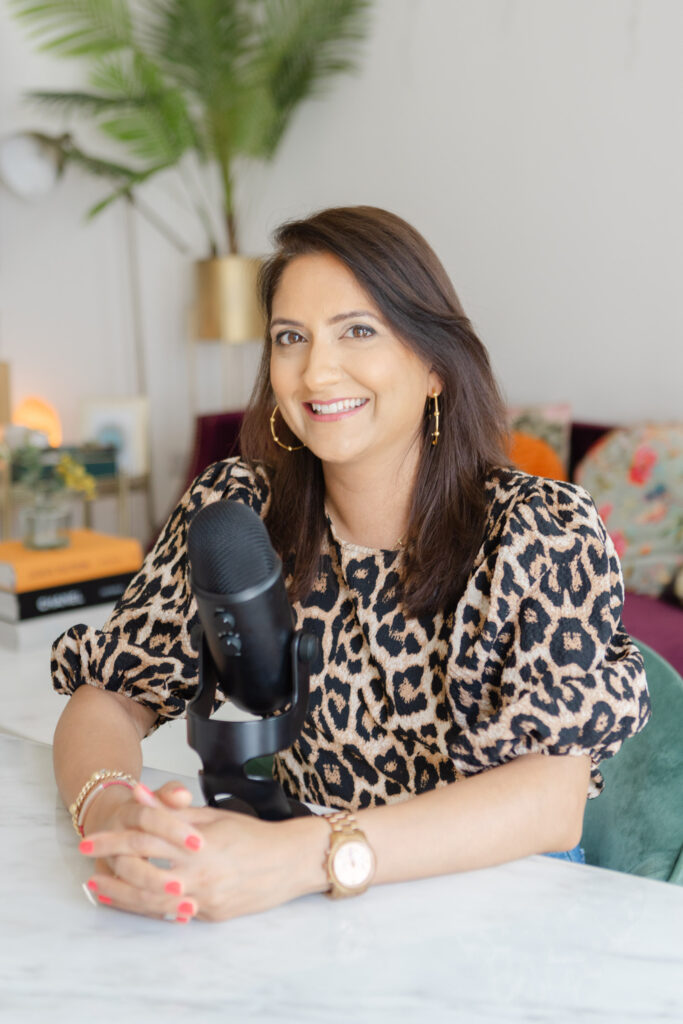Rupa Bharadva is a freelance copywriter, PR and communications expert. We used to work together. After 20 years in the corporate world, she started her own business. Rupa now works with business owners to help them stand out online. She shares her journey from the corporate sector to entrepreneurship.
Rupa, it’s great to reconnect! What motivated you to start your own business?
Thank you! To be honest, I don’t remember it being one specific event – it was a mix of things. I’d always worked in large companies and was ready for something different. As a mum of two young children, under the age of five at the time, I wanted to try and work for myself. I’d done freelance writing for UK and international publications over the years, so the desire to work for myself was always there. This time, though, I wanted to see if I could really do it as a business.
Can you share when you knew it was time to take the plunge?
There wasn’t one clear moment. I remember thinking, OK, I need to take action. I was looking at other jobs and weighing up my options at the time. I realised I could build my business on the side while having the security of a steady income. I set up my business as a side hustle in August 2021 while still employed and left my corporate job to make the full transition in January 2023. During those two years, I did a lot of inner work and invested in myself. I hired a business coach to make sure I started on the right foot. I’d tried to launch my business before but bottled it. I hadn’t been ready. This time, the coaching helped build my confidence and goals to make my business a reality.
What were some of your biggest challenges during that transition from corporate life to entrepreneurship?
I would say facing the unknown. I’ve worked within large companies since I was 16 and always had a regular pay check. I no longer had a consistent income or felt part of something bigger. The loneliness at times, too. When you work for yourself as a small business, you don’t have an HR or finance team, you’re on your own. That took some getting used to. But I love it now. I have the flexibility and get to define the type of business owner I want to be. You hear of the hustle culture mentality which is just not me. I’m in tune with my values. I want to deliver the best work possible, be passionate about what I do, and do it with integrity. It’s equally important I build strong relationships and make good decisions about who I work with. And doing that all while being creative, playful and balancing family life!
How did your corporate experience prepare you to run your business?
I trained as a journalist and have always worked in communications. Corporate life gave me the skills to quickly adapt to changing priorities, manage my time and workloads, and have the right processes in place to run my business. I still start my day in a similar way by keeping abreast of company news every day, for example, to apply to my clients’ communications. Ultimately, corporate life grounded me and gave me the tools I still use today.
What new skills did you have to learn to become a business owner?
I’m very comfortable with words, but not so much with numbers. I had to learn to understand the numbers behind my business – how to price my services, build a pipeline, etc. I also had to get up to speed on web analytics and social media metrics and put measurements in place. Networking is another skill I’ve learnt. I would describe myself as sociable but introverted. My job was always to promote others and their business, and then all of a sudden, I had to put myself out there and be more visible. But going to events and meeting people I’m aligned with, such as other working parents or small business owners, helps. I’ve found it’s not a competitive environment, and people genuinely want to help, which is lovely.
You recently ventured into podcasting! How has that experience been?
I wasn’t expecting to launch a podcast! I co-host The Courageous Collective podcast, which I run with Vardeep Edwards, a brand specialist. We wanted to showcase women like us – creative business owners who are women of colour. We amplify stories of business founders who you wouldn’t find anywhere else.
At first, we talked about creating a magazine, but we decided to do a podcast so people could hear these women’s voices as they shared their business journeys. That felt more powerful, as you can have deeper and more meaningful conversations. It’s also a great way to connect with your audience, as you’re in their ear while they’re out on a walk, on a train, or at home doing chores. We’ve now built a community with our listeners and the women we’ve met.

Rupa hosting her podcast, The Courageous Collective, that celebrates diverse women and business owners who dare to do things differently.
How has your approach to communications shifted from working in a corporate environment to supporting small businesses?
I don’t think my approach has changed – whether you’re communicating for a large company or small business the elements are similar. The key is understanding the business, its founder, the audience and brand. What do they want to communicate, to whom and what are their goals? A business owner will often tell me they don’t have anything interesting to say, but after talking to them and asking questions, I’ll uncover a unique skill or challenge they overcame that led to them starting their business. That always makes for a great story. My approach, therefore, hasn’t changed; it’s how I adapt my style according to the business or owner to tell their story. It’s inspiring to be part of their journey and be that external voice that helps them launch their business or grow successfully.
Building a client base can be daunting. How did you approach it?
It was terrifying at first! I hadn’t told anyone about my side hustle of being a copywriter and providing communications support to small businesses. I made the brave decision to speak to my line manager at the time. She made me feel it was OK to talk about my side hustle while still working in a corporate role. I then set up my website and socials and sent messages to my networks. One person was looking for copywriting support, which then led to referrals and more business. It didn’t happen overnight and took lots of consistent marketing and being really clear on what services I offered.
What communications strategies do you think are most effective for small businesses?
Be clear about what you stand for, your values, purpose and vision. What’s your story and USP? Understand your audience, their needs and how to connect with them. It’s also good to experiment. That’s the beauty of small businesses. They’re more agile. It doesn’t have to be a grand campaign, but being able to articulate your business in a meaningful way can be impactful.
You spoke at an event about artificial intelligence (AI) and its impact on communications. Do you think AI is a threat or opportunity in communications?
My perspective on AI has changed over time. Three days after I quit my job, ChatGPT launched. I remember thinking, “Oh no, I’ve made a mistake, as it will make my business redundant!” I now see AI as a comms partner and enabler, not a threat. It’s a good starting point for writing drafts, but I don’t rely on it to write content. I don’t think it can replicate how humans talk, our nuances or colloquialisms. I use it, though, for admin. What would take hours of writing up interview notes is now more efficient with AI notetakers. In that respect, AI helps give us the capacity to be more creative. But not to take over our writing because the joy of what I do is being able to express myself and find the words that capture how my clients feel. AI content can sound very samey and void of emotion, so I don’t think it offers the creativity that comms professionals and writers can bring.
What’s been the most rewarding part of your journey as a business owner?
That sense of fulfilment. I’ve built this business from scratch. Also, I’m helping others build their own business, which is empowering and inspiring .
Finally, what advice would you give someone wanting to start their own business?
Just do it. You don’t have to launch your business straight away, but if you have an idea, write it down and develop it. Test it with people – especially your target market. It’s good to dream big, but a plan is what will set things in motion. Save money, too, for taxes or slower months. I’ve become a believer in the power of goal setting and visualisation. What you put out there and work towards will manifest.

Thanks Rupa! It’s always great touching base. You can connect with Rupa via her website, podcast or social media.

Such a great article! There are so many corporate professionals finding satisfaction in entrepreneurship, and switching gears after decades of success in the corporate world. The risks are great and the rewards are even greater. Her fear of facing the unknown is so real. I found her story to be inspiring
Loved this interview! I can’t wait to check out the podcast too.